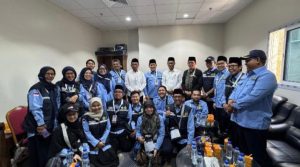
Mecca – The Secretary General of the Indonesian Ulema Council (MUI) urges all Indonesian pilgrims to focus on preparing for the peak Hajj pilgrimage through the series of Armuzna (Arafat, Muzdalifah, and Mina).
In a press statement issued in Mecca, Saudi Arabia, it was emphasized that worship in these three locations must be performed with full concentration as part of the obligatory rituals to ensure pilgrims complete the peak of Hajj worship well, with hopes of a successful pilgrimage.
Why focus? According to the Secretary General, the series of Hajj rituals in Arafat, Muzdalifah, and Mina is the most challenging stage of Hajj. This sequence of worship also distinguishes Hajj from Umrah.
These three locations are often referred to as critical points in the obligatory Hajj activities, as they exhaust both physical and mental energy. It is not uncommon for pilgrims to fall ill from fatigue during or after the process.
«We hope that during Armuzna, pilgrims remain vigilant so they do not fall ill or get separated from their group, which would create difficulties for officials in locating them,» said the MUI Secretary General.
All pilgrims must focus on preparation, from intentions to practical arrangements, including: first, paying attention to the worship process as pilgrims begin moving toward Arafat on the 8th of Dhu al-Hijjah.
They should prepare all necessities for smooth worship: Ihram clothing, belts, identification bracelets, maktab bracelets, and other documents.
Second, pilgrim passport bags must not be forgotten. These bags should contain medical records, prayer books, wallets, as well as medicine and sufficient multivitamins.
Third, each pilgrim should carry bags that can hold various items, such as spare shirts, extra Ihram cloth, communication devices, and a Quran.
Successful Hajj
The MUI Secretary General also expressed the belief that the presence of Indonesian pilgrims in the Holy Land should bring peace and security to society and the nation in the future, as they carry the values of a successful Hajj.
As narrated by the companion Jabir bin Abdullah RA, the Prophet Muhammad SAW said: «A successful Hajj has no reward other than Paradise.» The companion then asked: «O Messenger of Allah, what constitutes success?» The Prophet Muhammad SAW replied: «Feeding others and speaking good words.»
According to the Secretary General, the hadith mentions two traits of a successful Hajj as taught by the Prophet Muhammad SAW: feeding others and always speaking good words.
Therefore, if 221,000 pilgrims depart from Indonesia each year, this represents a tremendous potential to influence peace within society and the nation in the future.
This means that, at the very least, every year the country will see «new individuals» ready for reconciliation and prosperity—people with high social awareness and sensitivity, as well as those who think and act wisely, politely, and calmly.
Thus, the more people perform Hajj, the greater the likelihood of Indonesia having individuals marked by a successful Hajj, making it easier for the country to overcome multidimensional crises, whether moral, economic, political, or cultural.
«We await the presence and actions of successful Hajj pilgrims in Indonesia to bring prosperity and peace to the national life of our beloved republic,» said the Secretary General, accompanying the Deputy Amirul Hajj of Indonesia, who is also the Deputy Minister of Religious Affairs.
Regarding the pilgrimage itself, the Deputy Amirul Hajj expressed gratitude that no complaints have been received so far, such as regarding pilgrims’ flights.
«This year, Hajj flights have been even more punctual than last year,» said the Deputy after meeting with Indonesian pilgrims in Mecca.
During the meeting, pilgrims were also urged to maintain their health, especially during their stay in Arafat.






